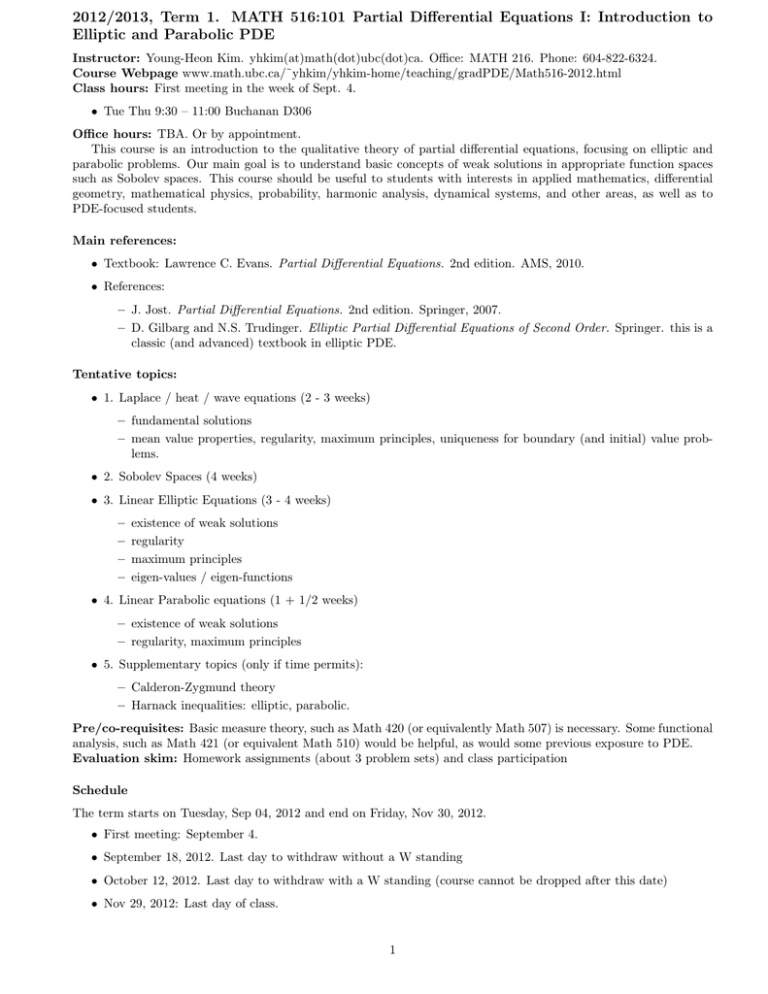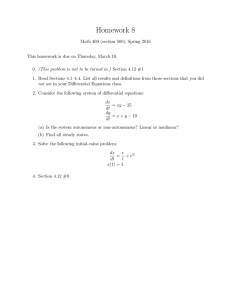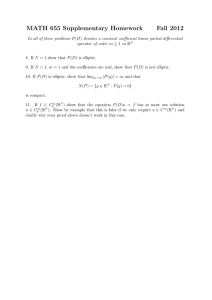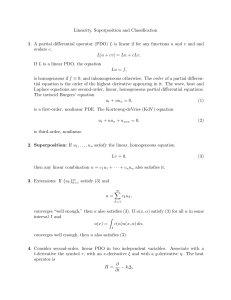2012/2013, Term 1. MATH 516:101 Partial Differential Equations I: Introduction... Elliptic and Parabolic PDE
advertisement

2012/2013, Term 1. MATH 516:101 Partial Differential Equations I: Introduction to Elliptic and Parabolic PDE Instructor: Young-Heon Kim. yhkim(at)math(dot)ubc(dot)ca. Office: MATH 216. Phone: 604-822-6324. Course Webpage www.math.ubc.ca/˜yhkim/yhkim-home/teaching/gradPDE/Math516-2012.html Class hours: First meeting in the week of Sept. 4. • Tue Thu 9:30 – 11:00 Buchanan D306 Office hours: TBA. Or by appointment. This course is an introduction to the qualitative theory of partial differential equations, focusing on elliptic and parabolic problems. Our main goal is to understand basic concepts of weak solutions in appropriate function spaces such as Sobolev spaces. This course should be useful to students with interests in applied mathematics, differential geometry, mathematical physics, probability, harmonic analysis, dynamical systems, and other areas, as well as to PDE-focused students. Main references: • Textbook: Lawrence C. Evans. Partial Differential Equations. 2nd edition. AMS, 2010. • References: – J. Jost. Partial Differential Equations. 2nd edition. Springer, 2007. – D. Gilbarg and N.S. Trudinger. Elliptic Partial Differential Equations of Second Order. Springer. this is a classic (and advanced) textbook in elliptic PDE. Tentative topics: • 1. Laplace / heat / wave equations (2 - 3 weeks) – fundamental solutions – mean value properties, regularity, maximum principles, uniqueness for boundary (and initial) value problems. • 2. Sobolev Spaces (4 weeks) • 3. Linear Elliptic Equations (3 - 4 weeks) – – – – existence of weak solutions regularity maximum principles eigen-values / eigen-functions • 4. Linear Parabolic equations (1 + 1/2 weeks) – existence of weak solutions – regularity, maximum principles • 5. Supplementary topics (only if time permits): – Calderon-Zygmund theory – Harnack inequalities: elliptic, parabolic. Pre/co-requisites: Basic measure theory, such as Math 420 (or equivalently Math 507) is necessary. Some functional analysis, such as Math 421 (or equivalent Math 510) would be helpful, as would some previous exposure to PDE. Evaluation skim: Homework assignments (about 3 problem sets) and class participation Schedule The term starts on Tuesday, Sep 04, 2012 and end on Friday, Nov 30, 2012. • First meeting: September 4. • September 18, 2012. Last day to withdraw without a W standing • October 12, 2012. Last day to withdraw with a W standing (course cannot be dropped after this date) • Nov 29, 2012: Last day of class. 1



